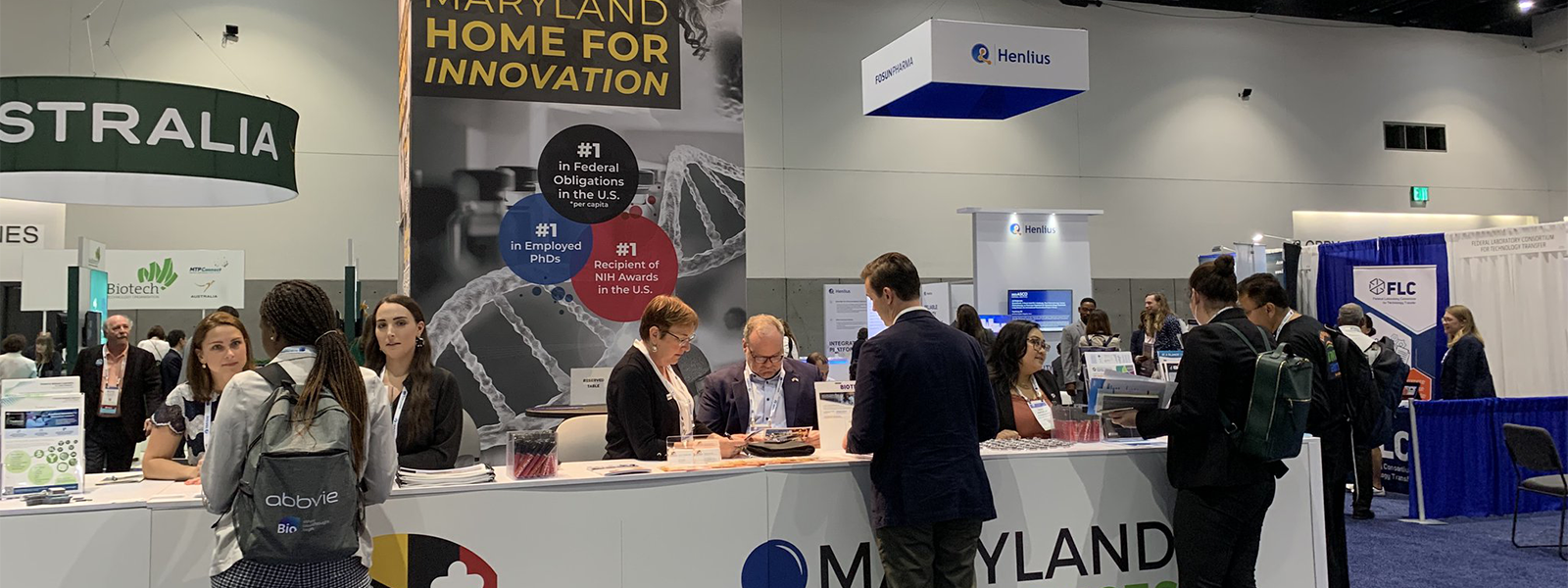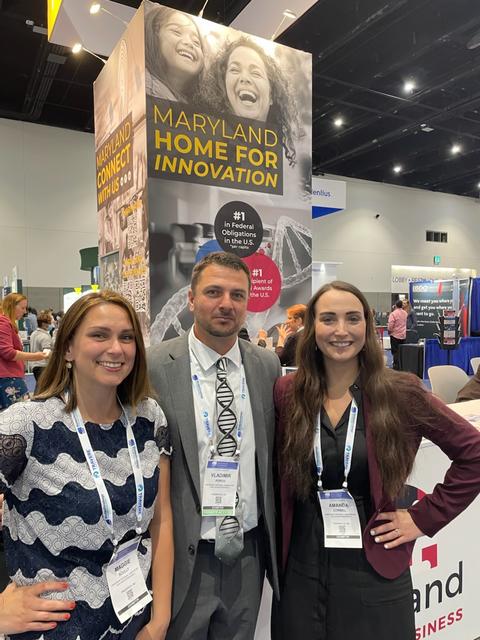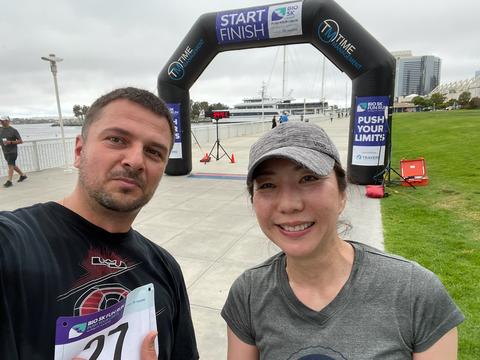Media Inquiries
Mary Ellen Hackett
Manager, Communications Office
301-401-8670

Pursuing future partners and better weather, the Frederick National Laboratory for Cancer Research (FNL) recently attended the BIO 2022 International Convention in San Diego. This convention is one of the largest biotech partnering events internationally, with over 3,000 foreign and domestic companies represented at this year’s week-long June event. This setting created an excellent opportunity to connect with the cutting-edge of the biotech field.
Networking: The Partnership Development Office
The FNL’s Partnership Development Office (PDO) cosponsored the Maryland Pavilion alongside five other organizations, including the National Cancer Institute’s Tech Transfer Center, which is also cohosting the 2022 Technology Showcase with FNL in September. Due to Maryland’s prominence in life sciences and the biotechnology fields, the pavilion was filled with constant traffic throughout the day, FNL's partnership team said.
On top of cosponsoring the pavilion, the partnership team organized extensive meetings with potential collaborators. The convention was designed around creating opportunities for introductions and building bridges, with some events offering “speed dating” style networking—one of the benefits of the convention’s return to in-person.
Described as “a certain refresher” by Vladimir Popov, Ph.D., PDO director, he said face-to-face meetings made networking far more effective. The three attending members of the partnership team, Popov, Amanda Corbel and Maggie Scully, Ph.D., estimated having led over 100 one-on-one meetings with potential FNL partners, including academia, nonprofits, government laboratories, small startup companies, and global biotech leaders.
Following two years of a virtual BIO, the return to in-person was done with caution and safety in mind. All attendees provided proof of vaccination and an additional booster, as well as a negative COVID-19 test, creating a safer environment for the important in-person networking conversations while trying to mitigate the spread of COVID-19.
The PDO members attended diverse receptions, including a Maryland-specific reception, a Women in Bio meet-up and a reception hosted on the USS Midway Maritime Museum to catch up with potential partners and expand their network.
“Receptions were such a great place to meet new people and promote awareness of the FNL and our missions,” Corbel said.

Even during the less-partnership-focused events, such as the 5K run hosted on the first day of the convention, the theme of aspiring
partnerships and impromptu connections was ever prevalent—especially for Popov.
“The run was a lot of fun,” Popov said. “I was actually out for a run of my own, but like with everything else in life, timing is everything. I happened to run into the 5K event just minutes before it started and decided to register on site and participate. Great decision, as it turned out.”
Popov did not elaborate on his 5K time; however, he was more than happy to discuss the people he met during the race.
“I met quite a few people that I kept seeing and chatting with throughout the conference, including a representative of a foreign company I later introduced to economic development folks and that now might be considering opening a location in Frederick County," he said.

The PDO members are now following up with the organizations they met at the convention, working to turn introductions into fruitful partnerships.
Technologies at the forefront of science
The PDO was also joined by members of the Cancer Data Science Initiatives (CDSI), Ryan Weil, Ph.D., and Naomi Ohashi. While open to partnerships, the CDSI members attended primarily to evaluate the technologies at the forefront of the cancer, disease and data science fields, while also learning about the research community needs. As a national laboratory, working in the public interest and not as a competitor, the FNL strives to evaluate the industry and see where its abilities could move the science forward.
Weil described BIO as “one of those meetings that everyone is at,” creating both an “exhilarating and exhausting” week. With over 14,000 attendees representing industry leaders across the globe, he said BIO is the place to evaluate the latest advancements in disease research.
These included technologies such as animal model replacement, along withartificial intelligence and machine learning to address a host of cancer-related questions. In addition to showcasing where the cutting-edge of the field lies, Weil said the conference gave insight as to where the innovations supported by CDSI can best serve the broader community.
Much like the PDO, Weil stressed the importance of the conference’s networking-oriented setup and the importance of an in-person gathering.
“So much of BIO is that random conversation you have in the lunch line,” Weil said.
Through the conservations started at BIO, the FNL attendees were able to broaden partnerships and effectively evaluate the industry.
“With the breadth of life science organizations represented, BIO is a critically important event for the FNL,” Scully said. “Being the only national laboratory exclusively devoted to biomedical research, being accessible at BIO is essential to the crucial work we do in the public’s interest.”
